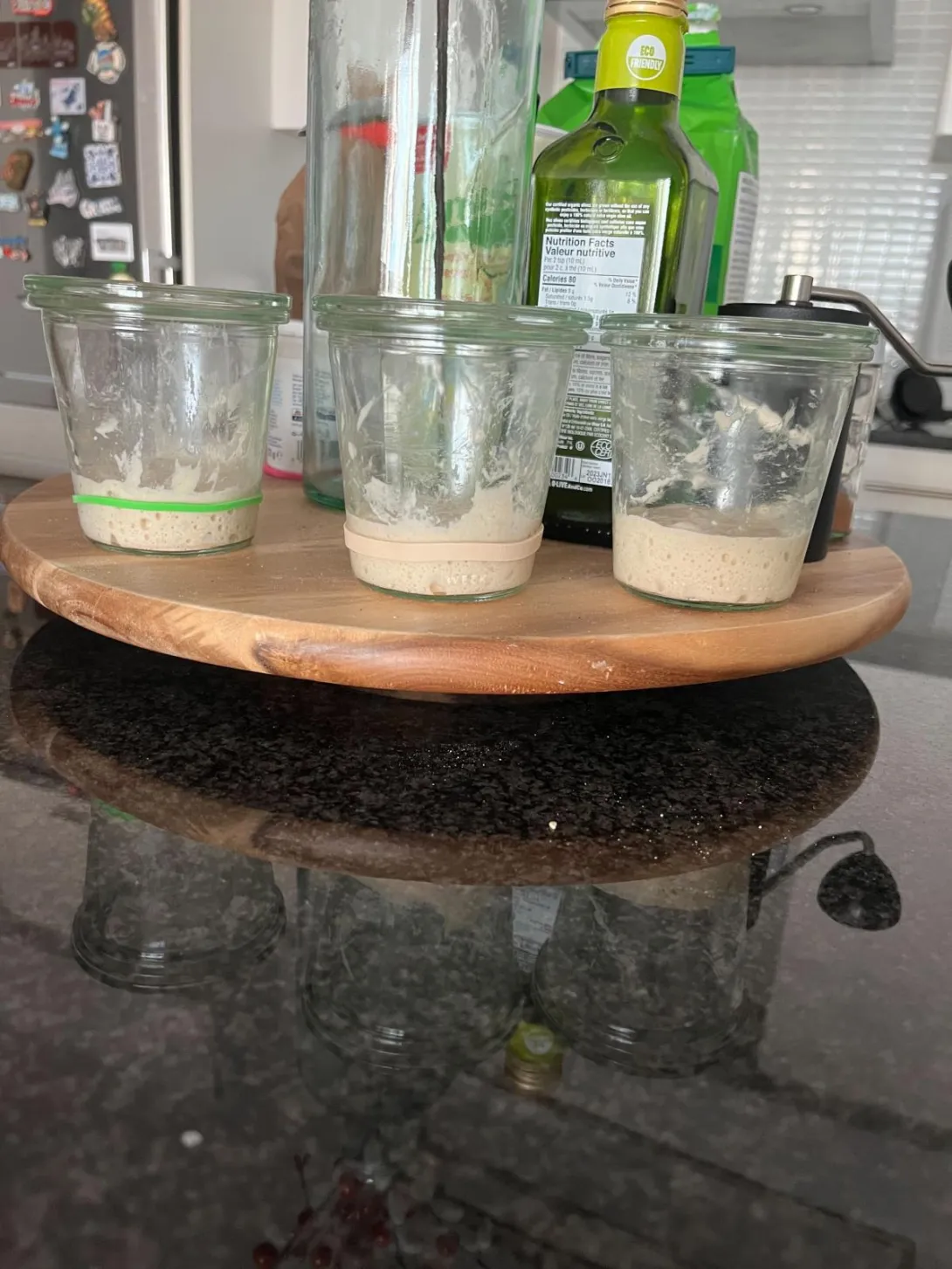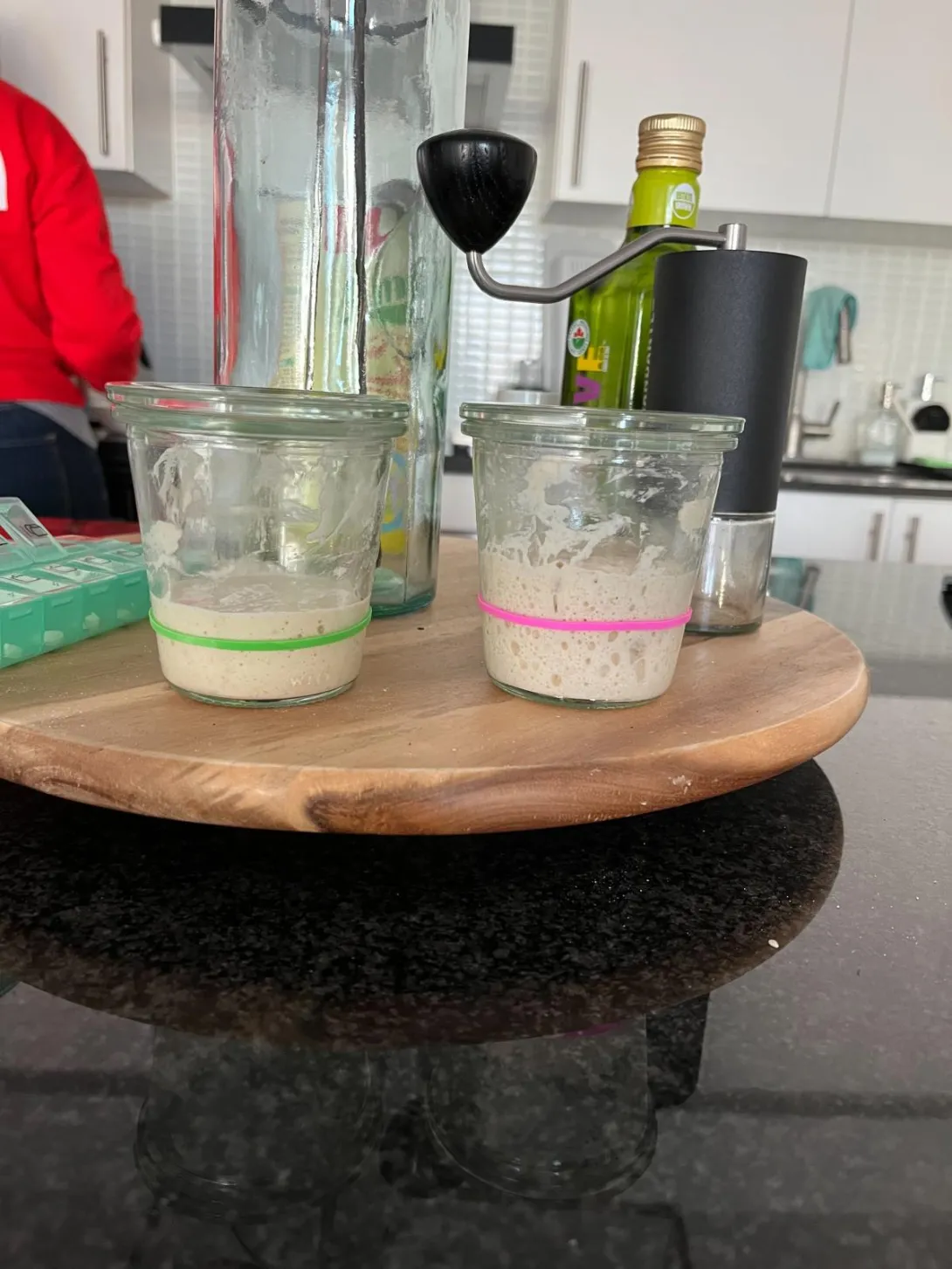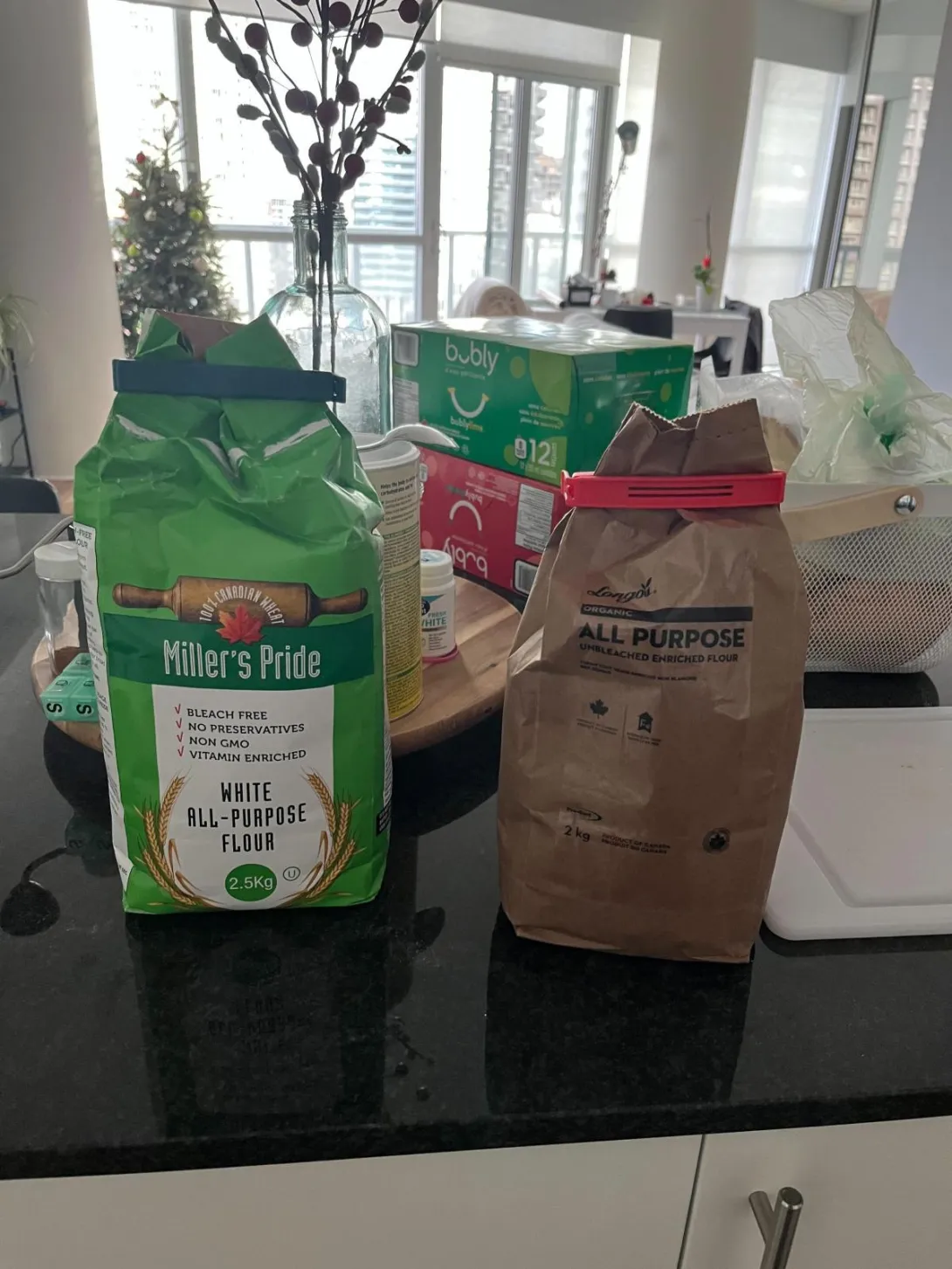Hi everyone 👋
I am having a problem where my dough won't double in size if I don't use commercial yeast together with my sourdough starter.
My starter is generally pretty active. I feed it twice a day 20g AP unbleached flour and 5g rye flour. It normally triples in size.
To see if the problem is the flour, I tried feeding my starter with only AP flour and noticed it won't double in size either.
I am using Canadian flour from bulk barn, but lately I bought two other options to see if the problem was that specific flour, but got the same results.
This Image shows three starters with three different flours in the morning after I fed it the previous night.
And here I have another attempt. Green is 100% AP flour and pink a mix of AP flour with ONLY A BIT of rye and whole wheat.

Here are the flours I used (besides the Bulk Barn one):

Any ideas?
Endless apologies if you already knew this: the most frequently reported problems with starter cultivation over many years of archived posts are due to water quality. If you are using municipal (city tap) water be advised that the water department can introduce additives like chlorine and chloromines "without warning". Tap water that worked fine for decades can suddenly start inhibiting your starters and levains.
If you are already using bottled water or water from a commercial reverse osmosis plant then try lowering the hydration of your starter to 75%.
This starter uses a 90-5-5% blend of WBF-WW-Rye flours similar to yours.
Lastly, try starting a new batch using 10 grams of your most active starter mixed with 43 grams of purified water and 57 grams of your flour mix.
Good luck. Dave
Nice, Dave!! Please don't apologize. That is great advice.
I do use water from the tap. I was assuming the water quality in Toronto would be good. I will try bottled water next.
I did try 75% hydration this morning. And am waiting to see the results.
We do have good quality drinking water here in Toronto where I also live, “hi neighbour” but our city uses both chlorine and chloramine to treat the water. Most water filters do not remove the chloramine but do remove the chlorine. Boiling the water or leaving it out overnight will not remove the chloramine either. That being said, I use filtered tap water and have no issues with my sourdough starters because of the water. Just make sure you filter it.
I haven’t read through all your responses to your question, but I see you’re in good hands with Abe. But I will comment that 100% hydration AP flour starter/levain is much more batter like than a similar hydration with any amount of whole grain added in. If you want to see rise, either stiffen the starter by going to a lower hydration or, really work the starter/levain at mix to build the gluten somewhat to hold the gases produced so you can see the rise better.
Benny
Are narrower at the bottom and widen as it slopes upwards (like a bowl shape). So what looks like doubled is more. Dave's container is narrow and doesn't slope upwards, just straight up, giving an accurate reading of how much his starter rises.
Curious as to how you're measuring doubled when it comes to the dough. Are you using a bowl and how much does the dough fill it? If it is a bowl and the dough doeasn't fill it then very difficult to judge doubled. All you need to look out for is a puffy and aerated dough or you can use other means of measuring like an alicot jar.
But at the end of the day the most important point is do you get a nice loaf of bread? If so the rest is moot.
Excellent points! I agree 100%.
Use a poke test. Also have a decent bulk ferment, then shape and proof. Ensure your dough is a reasonable proofing temperature.
I use 100% rye from bulkbarn for years and have no issues. I'm a bit lost why a number of people insist on using generic AP from the supermarket.
White flour in North America comes from separating the kernel into pieces and leaving out the bran and other outside bits... where wild yeasts would be. So it seems to me that using generic AP is using the least yeast-infused part of grain to try to develop a sourdough culture.
All my bread water is from tap then filtered using a Mavea filter. However I don't change the filters often.
Fwiw I was using a combination of Rye and AP, and it was rising nicely.
Yeah great points indeed. I actually don't know if it doubled or not. The differences are: with the yeast, the break rises nicely and is not slack after bulk fermentation. It also has a great oven spring. With 100% sourdough, I can never get it to get as gassy as with the yeast, and the final dough always end up slack and doesn't have an oven spring. The crumb is also a lot heavier and chewy, and tastes TOO sour.
Heavy, dough too slack and lacking in oven spring? This might all be solved by making a levain and catching it at the right time.
Might be starter maintenance and/or timing issue.
Could be, when I mixed the starter it was at its peak and the consistency seemed right though.
Starter (g) + Water (g) + Flour (g) ?
How long till it peaks?
Typical starter prep before a bake?
5-7g Starter
20g Water
25g Flour (20g AP and 5g rye)
It takes ~4h to peak
Starter prep before bake:
40g Starter
160g Water
200g Flour (160g AP and 40g rye or whole wheat)
Starter Maintenance is close enough to 1:2:2 and 4 hours to peak to good timing.
Starter prep for baking is very much a levain type feed and 20% starter. If used when just peaking then that should be good to use.
Bit of a puzzle why your dough has little strength, is heavy and too sour unless the problem is reading when the dough is done.
Perhaps you need to cut back on the bulk. Sorry to be a bother but now i'm going to ask you your typical recipe and timings....?
This sounds like a similar problem I have had recently. I was making baguettes with instant yeast for a few months and I thought I was getting close to nailing it down the way I like it until I started using sourdough starter back in Oct, which has been driving me crazy with some inconsistent results. Don't think if I can offer anything helpful here but at least I can describe what I have gone through. I find that if I develop the dough strongly right from the beginning, my starter does not like it, it will rise very slowly and would stop rising at the 30% mark (I use a tall marked container). When I say developing the dough strongly, I mean I autolyse it for 3 hours (sometimes overnight), beat it with a very efficient mixing machine, do lamination and coil folds, etc. all in the first two hours of BF. Apparently my SD yeast does not like a strong dough as weird as it may sound. My SD baguettes (and pizzas too) were also very sour, it was so sour to a point of unbearable. I also find that if I mix the dough at a high speed, my SD starter will die which sound unreal and the dough does not rise at all after 12 hours of BF.
@thiago, Welcome to TFL. Glad to have you aboard.
In a word Enzymes - either added amylase, or malted barley flour, or malted whear flour.
Check the ingredients list on your flour packages. If your AP flour has none of those three, it is not "directly" suitable for making yeasted/sourdough bread, but only chemically leavened (ie baking powder) or non-leavened products.
Enzymes turn the starch into sugar upon which the yeast feed. No sugar, no food, and therefore yeast go dormant.
Whole/medium rye flour is rich in enzymes, more so than whole wheat, so a little rye "saves the day" for the AP if the AP came without added enzymes.
Work-arounds:
- add some diastatic malt powder or malt flour (enzymes).
- add sugar or dextrose or maltose (malt syrup or dried malt extract), IE., direct food for yeast.
Or... switch to an AP flour that has added enzymes such as amylase or alpha-amylase. In the US the enzymes are usually added to white flour (Bread and AP flours) in the form of malted barley flour. In Canada, I think it's usually amylase.
Good luck, and bon appétit!
Wow, great insight on the Enzymes. I just bought diastic malt to give it a shot. That's the only thing left for me to try from the suggestions here I think.
One thing though, I haven't fed my 100% AP starter for > 24h and it seems very active just now. It's not to the point of feeding yet (see pictures).
Tbc, this one doesn't have added diastic malt.
Just curious, which of the 3 brands (Bulk Barn, Miller's Pride, Longo's) didn't already have amylase/malt ?
None of them had it. I looked at a bunch of Canadian flours and couldn't find any with added malted flour (like KA flours do).
Btw, I did another experiment, and the malt seems to have helped!
In the image below (all this morning after I fed them last night):
Blue – 25g AP
Pink – 24.5g AP, 0.5g malt
Yellow – 20g AP, 5g rye
I will try the bread today to see how it goes.
Ensuring that there is a bit extra amylase in your starter/levain will definitely speed up the fermentation. a couple of years ago I noticed that my starter fed whole rye would grow much faster than the same starter fed whole red fife. I did a comparison where I added 0.5% Diastatic Malt to the whole red fife levain and compared it to the same levain without Diastatic Malt fed whole red fife and again without Diastatic Malt fed whole rye.
The slowest to grow was the whole red fife without Diastatic Malt. The whole red fife with diastatic and whole rye fed levains grew at the same rate.
It has been some time since I've played around with white flours as I've been on a whole grain kick lately and even when I and using mostly white flour I typically will build the levain with whole grain. Since you seem to have access to Diastatic Malt if you easily add it at 0.5% to your dough/levain if the flour you use doesn't have any. As Dave said, Robin Hood bread flour has amylase added, I do use that for white flour along with Anita's Organic Mill all purpose which doesn't have added amylase.
I just checked robinhood.ca
Their AP Original (bleached), AP unbleached, and Best for Bread Homestyle White, all have amylase listed in the ingredients.
Their AP Organic does not have amylase, nor malted flour.
HTH.
Oh interesting. I didn't think to check Robin Hood or Five Roses because I assumed they were just lower quality.
Nice find, thank you!
Oh interesting. I didn't think to check Robin Hood or Five Roses because I assumed they were just lower quality.
Nice find, thank you!
Interesting thread, lots of good points within. Thanks for sharing everyone.
@thiago: Users Benito and happycat, who commented above, are in Toronto, and can help you with brand/type selection for Canadian flours, and provide tips for the flours they use.
Other recent and frequent TFL contributors who bake north of the border are mariana, naturaleigh, and danni3ll3.
Bon chance et bon appétit, amigo.
Rogers All purpose has Amylase. (not the one labeled "no additives") As does Rogers bread flour.
I have good success with PC Organics All purpose white, (again no amylase or malt) but it seems to work well. I also learned not to use tap water.
I'm a bit late on this train, but may I ask why not using tap water??? thanks in advance :-)